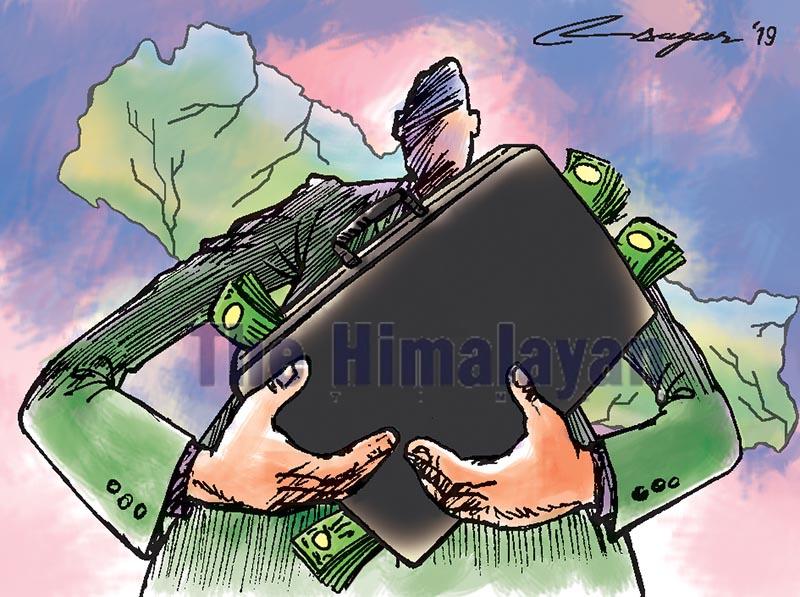Integrity deficit in parties: Weakening value-based politics
With the degeneration of politics and erosion of value-based norms and principles, the leaders of all the parties have lost their vision and turned, instead, to be shrewd managers, tactical players and game manipulators
Nepal’s political parties are personality-driven, leadership-oriented and functionally very inefficient and ineffective. In fact, the parties cannot afford to be efficient and effective because they have to engage in transaction-oriented deals to whet and satisfy the lust for power and self-centred interests of the functionaries and leaders. The parties have to cater to and address the diverse personal aspirations and crash ambitions of the party cadres and client groups.
Intergroup dissent and bickering at times turn so bitter that the parties look like they are on the verge of breaking apart. Even if the petty interests of the dissident groups are addressed, even at the expense of public integrity, the intraparty conflict is only scaled down, not resolved. Once one category of intraparty dissent is resolved, another category of personality-centred group interests surfaces.
When intraparty dissent and differences lack principles and content, parties become transaction-oriented and a springboard for faction-based politics. Such a situation throws a spanner in the wheel of the parties to move ahead and take decisions in an efficient and effective manner. As a result, parties fail to rise to the occasion promptly and respond to national challenges.
Moreover, ideology-based principles, ethics and standards have almost been waning these days. The communist parties are undoubtedly known for their hairsplitting debates and polemics. But these days, they don’t seem to be very active in defining ideology and principled discourses. The politics of raw opportunism, unprincipled coalition and alliances, spearheaded by electoral fetishism, have overwhelmed them. From the ideology point of view, too, it is difficult to distinguish the left from the right. Politics has converged on unprincipled alliances and sharing of the crumbs of power and pelf without any regard for the known ideological spectrum of the left and right.
The politics of convergence, characterised by the diminution of the ideological divide, has become the norm. There was a time in the previous decades when differences between the Nepali Congress and the Communist parties were projected and portrayed to be antagonistic, both in terms of ideology and practice. But now the ideological pretensions have waned and withered away and almost come to naught. The inter-party antagonism and contradiction among the communist groups during the decades of the Fifties, Sixties and Seventies had been very explicit and articulate when the communist parties the world over were divided and beholden to the then Soviet and Chinese blocs. Those who tended to cast their weight behind the Soviet bloc were flayed as revisionist and reformist whereas the adherents to the Chinese camp claimed to be the real Marxist and champions of the people’s democratic revolutionaries.
After Deng assumed the political leadership in China during the Eighties, he introduced measures to transform the Chinese economy through the pursuit of free market capitalist reforms. Deng followed pragmatic politics, sending the rigour of ideology into oblivion. In Nepal too, the Maoists who had waged a ten-year armed conflict during the previous decades abandoned the path of violence that had provided the fuel for their struggle against the state.
They have integrated with the CPN (UML), metamorphosing themselves into the Nepal Communist Party, and catapulted themselves into the ruling elite of the country. Prior to integration with the CPN (UML), the Maoists had joined hands with the Nepali Congress – the ideological archrival - to run a coalition government and contest the local elections in liaison with each other.
The Netra Bikram Chand-led group – a splinter faction of the Maoists - that is said to be fighting to continue the legacy of the now dissolved Maoist party is reportedly showing overtures of peaceful reconciliation. The Biplav group should have been prompted to sit for dialogue with the government upon careful assessment of the futility of armed conflict in the contemporary global and Nepali context when political convergence has been the order of the day.
Similarly, the moderate Nepali Congress party has also compromised on its principles and values to pursue short-term gains and interests. It has cohabited time and again with the right and left parties and political groups for power that in no way is compatible with its long-held views and perspectives. With the degeneration of politics and erosion of value-based norms and principles, the leaders have lost their vision and turned, instead, to be shrewd managers, tactical players and game manipulators.
The routine task of the leaders has boiled down to juggling with the day to day affairs of the party and keeping one’s position safe and secure. They are embroiled in tackling complaints and petty interests of their party functionaries and cadres. The leaders squander valuable time and resources in managing dissidence within the party.
The country can transform and achieve development and prosperity only when the political parties are transformative and integrative. The parties should be innovative and transformative enough to nurture ideas and a vision so that the leaders could shun petty interests to pay heed to the democratisation and development of the nation.






